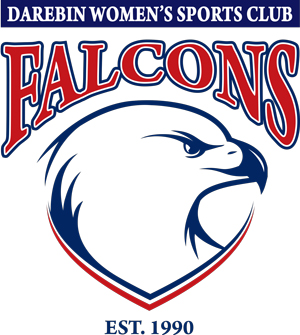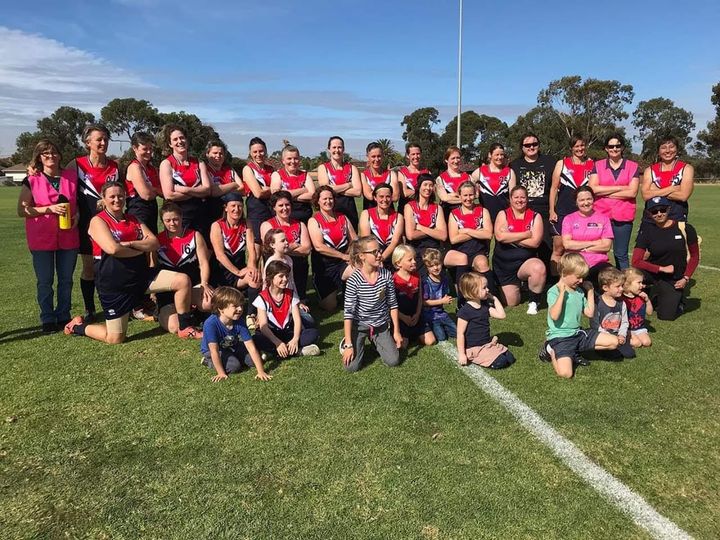The beginning of the AFLW had an enormous impact at grassroots. The Darebin Falcons were no exception. But while much of the AFLW narrative focussed on pathways for young women and girls to continue their football uninterrupted, for many women who felt like they missed out, or had never been given the space to even be curious when it came to footy, the growth of the women’s game gave them the chance to also wonder, ‘what if?’.
While the club’s senior and junior teams flourished after the inception of the national women’s competition in 2017, it would take until 2019 for the Falcons to field a team in the Masters competition.
Bec Hickmott who had played football and cricket with the Falcons remembers early discussions around creating a team. “I think we’d sort of had a few talks about it over probably two years leading up to [forming a team],” Bec said. “Occasionally we’d all go to watch the VFL girls, or we’d go and watch the AFLW and we just be sort of standing around and saying, ‘Oh, geez, wouldn’t it be fun if we could get out and do that again’… And I think I walked away from that going, well, let’s find out what’s involved. Is there a Masters league or something that we could play in? And it just sort of happened fairly organically from there.”
Bec reached out to the past players group and the response was positive. “I think we had like 20 people say, ‘Oh, yeah, I’ll totally play’ just from girls that had played before for the Falcons. And then we put it out on Facebook and then all of a sudden, we had like an extra 10 or 12 people that had never played before. So all of a sudden our list was, I think in the end, we had about 40-odd players that were on our list, and we didn’t try that hard either!“
Among those players were Claire Flynn, who was returning to the Falcons nest. “I felt I’d come home.” Claire said. It was a feeling echoed by Brenda Lang, who had been playing Masters with the Coburg Lions. “I went down to a training session [with Darebin] and I was like ‘oh yeah, this fits like a glove. I’m coming here’,” Brenda said.
Even though the Masters team was only able to have one season before COVID-19 caused community sport in Victoria during 2020 to be cancelled, it’s impact on the players was palpable, especially for Claire.
“I just loved it, there’s nothing better than just seeing women of a certain age, fucking playing footy! Because it’s mad! Like playing footy is mad as an adult who values the functioning of their body. There’s something about that that I’m attracted to in the types of people that come down. You can be really different about a lot of things and not everyone is your person. But there’s something about your willingness to be in a team that makes them your person.”
Many of the women who returned to the club to play Masters, or stepped back onto the field after a spell on the sidelines, had played together for years—some winning multiple premierships together. It made for an exciting and unforgettable beginning for the team.
“I have a very clear recollection of our first game,” Bec said. “It was the most beautiful day. No wind. Blue sky. And Anna Schwager was the ruck, Zachy (Kathy Zacharopoulos) ruck rover. And basically, the first play of the game, Schwager taps it down to Zachy, perfectly. Zachy baulks around someone, kicks it to me at centre half forward. I turn around, kick the ball straight to (Louise) Potter at full forward. None of us dropped the ball, we all marked it. Potter turns around and kicks the goal. And you know, we kicked the first goal in like the first 30 seconds… it’s like we hadn’t stopped playing football. It just happened so easy.
“I think the new girls that had never played before were just blown away by the skill that we had. But yeah, just, I don’t know, just to see the smiles on everyone’s faces… yeah, it was great,” Bec said.
Louise, who kicked that memorable first goal, was never going to pull the boots back on for any other team. “It’s not about just playing football. It’s about who you’re playing with, and who you’re playing for and who you represent. Early on, I played football because I wanted to have fun, and I wanted to win and we never did. But, the more you play, it’s more about who’s standing next to you and what your relationship was like with that person.
“I’ve said it on a lot of occasions at club functions when I’ve been asked to speak, that it’s about the people you meet and that’s the most important thing, because that’s what you’ll take away.”

